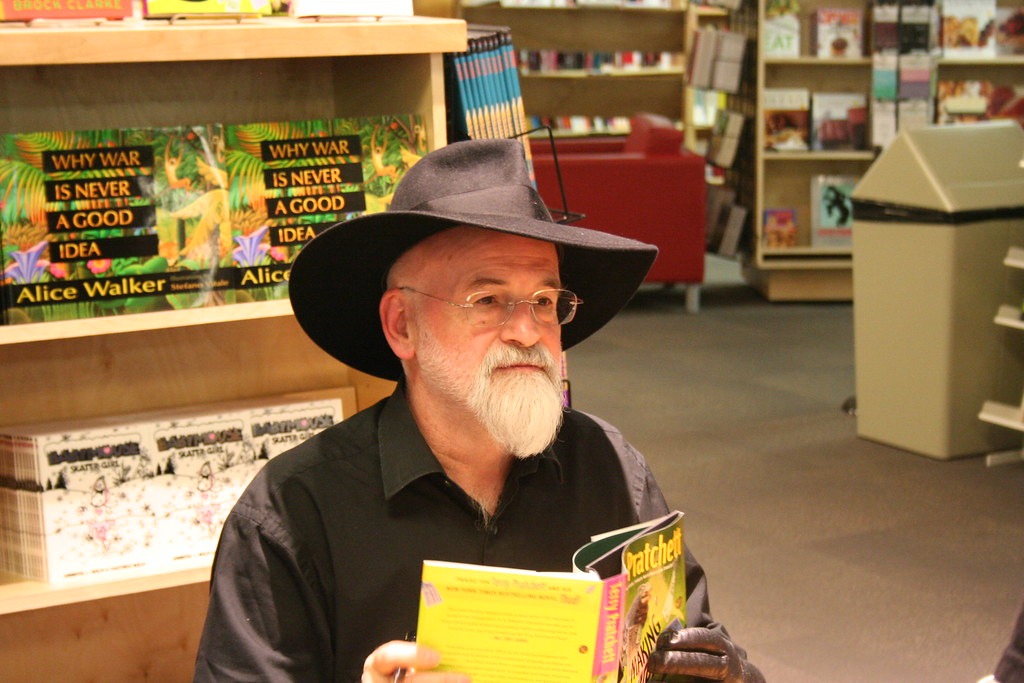Where to start: Terry Pratchett’s ‘Discworld’ series
More than forty years ago, Terry Pratchett introduced us to Discworld. A world that may sound and smell like our own, but looks completely different. A world that (as the name suggests) is shaped like a disc and is carried on the backs of four elephants, standing on the shell of the massive space turtle A’Tuin, who’s gender being a hotly debated topic amongst Discworld scholars, as they slowly journey through the cosmos. Hopefully, your next question is: where do I start?
If you don’t want to dedicate yourself to an entire series there are several excellent standalone novels, such as Going Postal and Small Gods.
Unfortunately, that’s where things get complicated, so much so that fans have made multiple charts to illustrate this. You must first know that the Discworld series comprises multiple sub-series: The Wizards, Witches, City Watch, Death, and The Industrial Revolution alongside a few miscellaneous books that don’t fit anywhere else (more on these later). Pratchett recommended that readers start with Mort, the first in the Death series, as he believed his writing had improved in quality by this point in his career. Popular recommendations by fans include Guards! Guards! which is the first in the Guards series, and Equal Rites, the beginning of the Witches saga. If you don’t want to dedicate yourself to an entire series there are several excellent standalone novels, such as Going Postal and Small Gods.
Ironically, the only hard and fast rule is to not start with The Colour of Magic, the very first book in the canon
Ironically, the only hard and fast rule is to not start with The Colour of Magic, the very first book in the canon. This is because as the first novel Pratchett wrote, it lacks his later flair and humour, feeling unrefined as a result. Additionally, it is the only book in the collection to have a direct sequel, The Light Fantastic, so if you read this one you will find yourself reading two books instead of one. Small Gods is the place to start if you don’t want to commit yourself to a particular sub-series (although they can all be read as stand-alone novels) right off the bat but still want to get a feel for the world. It serves almost as a prequel with the only long-running characters appearing being the “Librarian of the Unseen University” (a human who was transfigured into an orangutan) and “Death” (the protagonist of the Death series).
If you do want to start with one of the sub-series mentioned above, you must first pick your protagonist:
1) If you want to learn about the Wizards and how exactly the Librarian became an orangutan, meet Rincewind, the Disc’s most incompetent wizard, whose greatest talent is running away. His first novel is The Colour of Magic.
2) If Witches are more your scene, meet Granny Weatherwax, the Disc’s most powerful good witch, who was intended to become a wicked witch, but her sister got there first. She first appears in Equal Rites.
3) If you think magic is more trouble than it’s worth, then you agree with Sam Vines, the leader of the somewhat hapless but well-meaning City Watch. He first stars in Guards! Guards!
4) If you’ve ever wondered about Death’s work-life (no pun intended) balance, then luckily, Death stars in his series beginning with Mo.
There are two other protagonists. Tiffany Aching, whose novels are aimed at slightly younger readers, and whose first adventure, the Wee Free Men, is where my journey through Discworld began. Moist Von Liping has only three books to his name and was introduced much later, but the four listed above are the main key players in the series.
Ultimately, there is no ‘correct order’ and no matter which books you choose to start with (if this article has convinced you) all of Terry Pratchett’s works contain his characteristic wit and humour
Ultimately, there is no ‘correct order’ and no matter which books you choose to start with (if this article has convinced you) all of Terry Pratchett’s works contain his characteristic wit and humour. With a colourful cast of characters who lightly poke fun at various literary clichés and tropes (a personal favourite of mine is the City Watch attempting to create a million-to-one chance) whilst also building on and playing off them. Whether you’re a long-time fantasy fan or a relative newcomer to the genre, there’s something for everyone in (or rather on) Discworld.

Comments (2)
I’m old, I started with The Colour of Magic because was just out. I enjoyed it not as much as the later books though because Terry had refined his style.
I miss not having new Discworld books to enjoy though.
This is a useful article.
I started reading the Discworld series some years ago at a mountain cabin that had a lot of them. Even at random and out of order, they were great fun. I’m now re-reading some from my daughter-in-law’s small collection. Forcing that million-to-one chance to happen is so hilarious – reminds me of our government trying to make the nation “great” by destroying it.
Terry Pratchett is one of those authors one wishes could have lived and written forever.